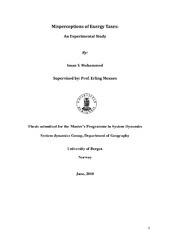| dc.description.abstract | Economists generally agree that in theory, fuel taxes are the most cost effective policies to address efficiency losses and combat environmental pollution (see eg. Baumol (1988); Dasgupta (1979); Izzo (2007); Mankiw (2006 ); Sitglitz, (2006)). Despite popular agreement amongst economists, nonetheless, fuel taxes remain extremely unpopular. The high perceived social cost associated with these forms of taxes makes it difficult to implement, as evident from the wide variation and low usage, globally, of energy taxes. What possible reasons could there be for resistance? Taxes have an effect in dynamic systems, where their impact is associated with delays, non-linearities and feedbacks. Such systems are highly complex and research has shown mass misperceptions of these systems. Few journals take into considerations these dynamics when discussing policies for implementing sustainable and buoyant fuel taxes in countries. To bridge the gap between theory and practice, this research paper makes use of an internet-based survey tool administered on Facebook (an online social networking service) to explore for possible reasons for misperceptions, as well as test for information policies and general factors that may influence support for fuel taxes. There has been little empirical analysis in these areas, and no study available that simultaneously tests both for the rationale and possible policy options for biases of energy taxes. Compared to earlier experiments where information policies where not tested, misperceptions persist in this experiment as well, information policies tend to have very little or no impact on decisions of participants. However the survey reveals that some factors namely revenue recycling schemes appears to boost more support for taxes than other variables. The high tendency to misperceive dynamic systems and their unintended consequences provides a strong motivation for this research. | en_US |
